Impact of ECE on Children's Character Development: A Detailed Analysis
VerifiedAdded on 2022/08/20
|6
|1258
|10
Essay
AI Summary
This essay examines the crucial role of Early Childhood Education (ECE) in fostering character development among young children. It delves into how an ECE's personal beliefs and values influence a child's character formation and identifies key factors contributing to ethical development, such as social norms, religious beliefs, upbringing, and laws. The essay also explores effective leadership strategies for character education both inside and outside preschool settings, emphasizing the importance of positive environments, role models, and teaching kindness and respect. Furthermore, it highlights the significant roles ECE professionals play in character education, including structuring curricula to teach values like courtesy, honesty, and discipline. The conclusion underscores the growing importance of ECE in today's world, particularly in guiding children and providing a strong foundation for their social and ethical growth. The essay references several studies that support the importance of ECE and its link to character development.
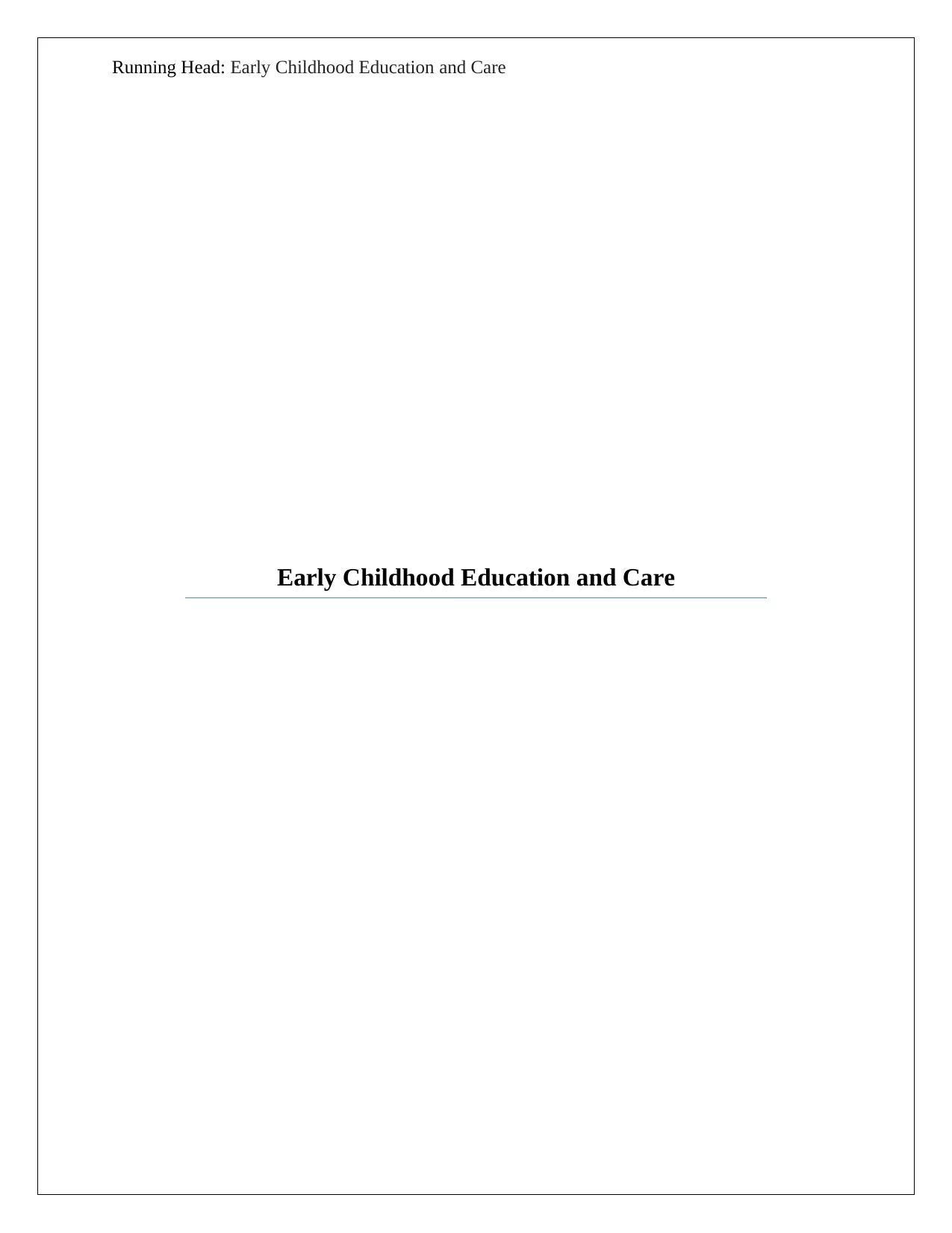
Running Head: Early Childhood Education and Care
Early Childhood Education and Care
Early Childhood Education and Care
Paraphrase This Document
Need a fresh take? Get an instant paraphrase of this document with our AI Paraphraser
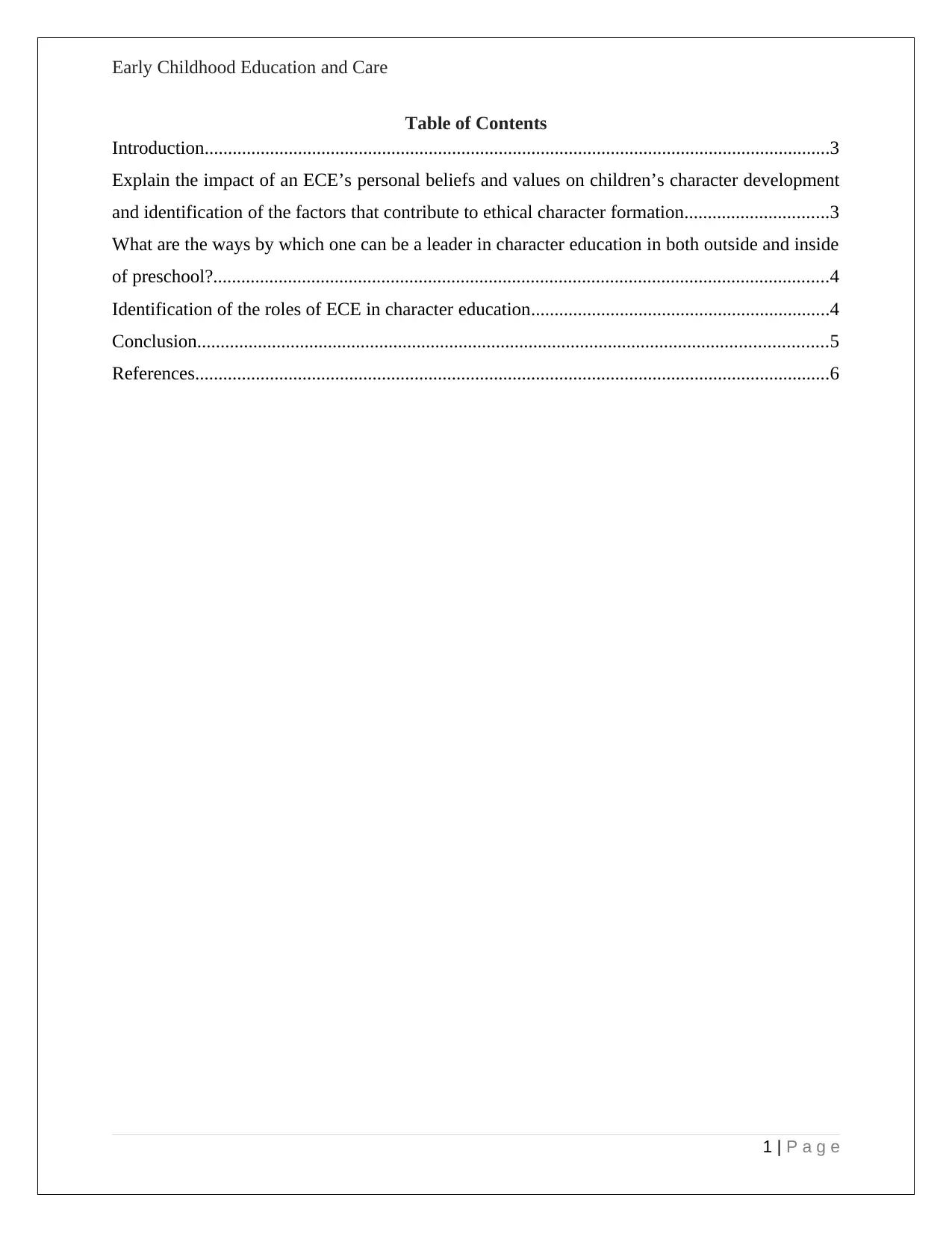
Early Childhood Education and Care
Table of Contents
Introduction......................................................................................................................................3
Explain the impact of an ECE’s personal beliefs and values on children’s character development
and identification of the factors that contribute to ethical character formation...............................3
What are the ways by which one can be a leader in character education in both outside and inside
of preschool?....................................................................................................................................4
Identification of the roles of ECE in character education................................................................4
Conclusion.......................................................................................................................................5
References........................................................................................................................................6
1 | P a g e
Table of Contents
Introduction......................................................................................................................................3
Explain the impact of an ECE’s personal beliefs and values on children’s character development
and identification of the factors that contribute to ethical character formation...............................3
What are the ways by which one can be a leader in character education in both outside and inside
of preschool?....................................................................................................................................4
Identification of the roles of ECE in character education................................................................4
Conclusion.......................................................................................................................................5
References........................................................................................................................................6
1 | P a g e
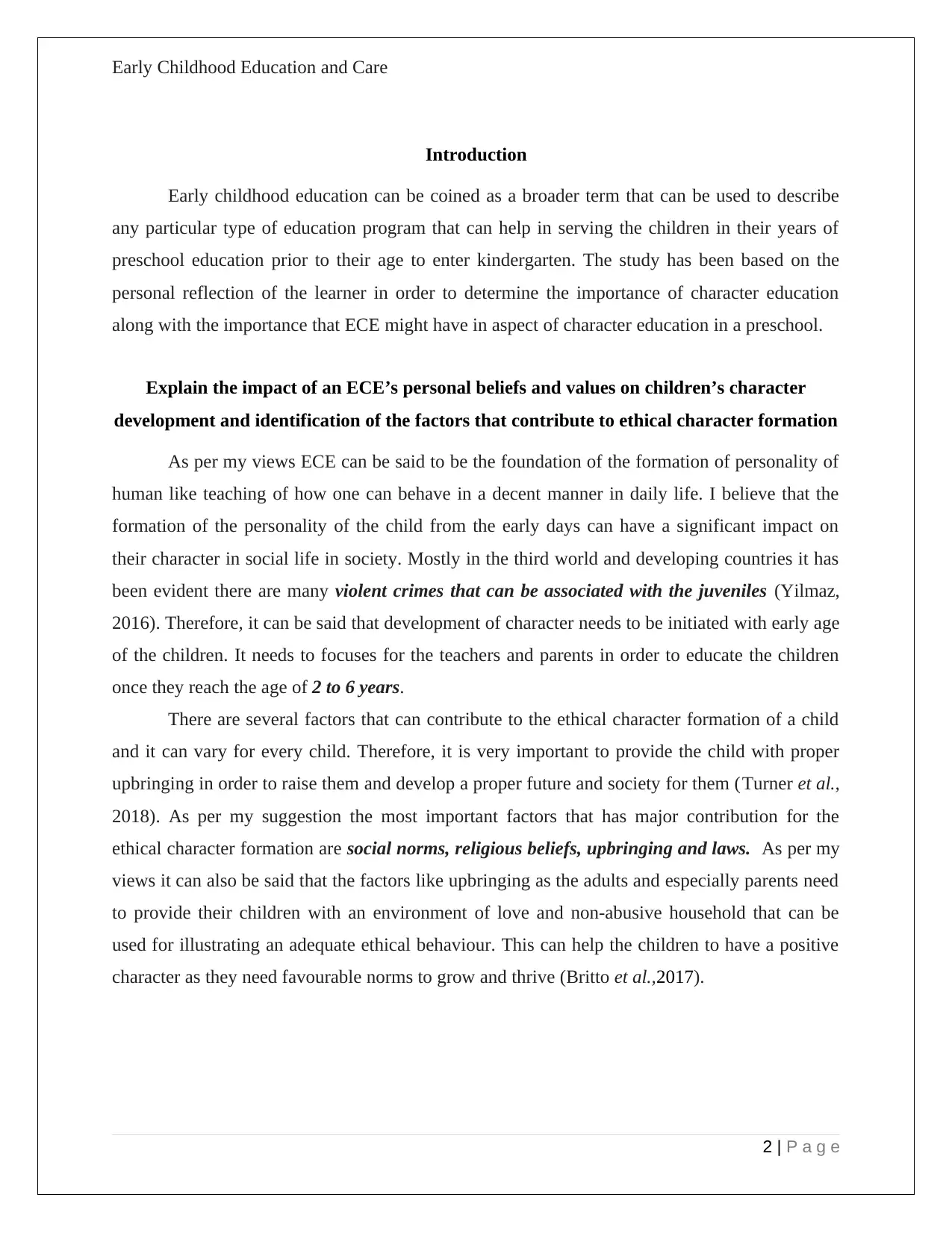
Early Childhood Education and Care
Introduction
Early childhood education can be coined as a broader term that can be used to describe
any particular type of education program that can help in serving the children in their years of
preschool education prior to their age to enter kindergarten. The study has been based on the
personal reflection of the learner in order to determine the importance of character education
along with the importance that ECE might have in aspect of character education in a preschool.
Explain the impact of an ECE’s personal beliefs and values on children’s character
development and identification of the factors that contribute to ethical character formation
As per my views ECE can be said to be the foundation of the formation of personality of
human like teaching of how one can behave in a decent manner in daily life. I believe that the
formation of the personality of the child from the early days can have a significant impact on
their character in social life in society. Mostly in the third world and developing countries it has
been evident there are many violent crimes that can be associated with the juveniles (Yilmaz,
2016). Therefore, it can be said that development of character needs to be initiated with early age
of the children. It needs to focuses for the teachers and parents in order to educate the children
once they reach the age of 2 to 6 years.
There are several factors that can contribute to the ethical character formation of a child
and it can vary for every child. Therefore, it is very important to provide the child with proper
upbringing in order to raise them and develop a proper future and society for them (Turner et al.,
2018). As per my suggestion the most important factors that has major contribution for the
ethical character formation are social norms, religious beliefs, upbringing and laws. As per my
views it can also be said that the factors like upbringing as the adults and especially parents need
to provide their children with an environment of love and non-abusive household that can be
used for illustrating an adequate ethical behaviour. This can help the children to have a positive
character as they need favourable norms to grow and thrive (Britto et al.,2017).
2 | P a g e
Introduction
Early childhood education can be coined as a broader term that can be used to describe
any particular type of education program that can help in serving the children in their years of
preschool education prior to their age to enter kindergarten. The study has been based on the
personal reflection of the learner in order to determine the importance of character education
along with the importance that ECE might have in aspect of character education in a preschool.
Explain the impact of an ECE’s personal beliefs and values on children’s character
development and identification of the factors that contribute to ethical character formation
As per my views ECE can be said to be the foundation of the formation of personality of
human like teaching of how one can behave in a decent manner in daily life. I believe that the
formation of the personality of the child from the early days can have a significant impact on
their character in social life in society. Mostly in the third world and developing countries it has
been evident there are many violent crimes that can be associated with the juveniles (Yilmaz,
2016). Therefore, it can be said that development of character needs to be initiated with early age
of the children. It needs to focuses for the teachers and parents in order to educate the children
once they reach the age of 2 to 6 years.
There are several factors that can contribute to the ethical character formation of a child
and it can vary for every child. Therefore, it is very important to provide the child with proper
upbringing in order to raise them and develop a proper future and society for them (Turner et al.,
2018). As per my suggestion the most important factors that has major contribution for the
ethical character formation are social norms, religious beliefs, upbringing and laws. As per my
views it can also be said that the factors like upbringing as the adults and especially parents need
to provide their children with an environment of love and non-abusive household that can be
used for illustrating an adequate ethical behaviour. This can help the children to have a positive
character as they need favourable norms to grow and thrive (Britto et al.,2017).
2 | P a g e
⊘ This is a preview!⊘
Do you want full access?
Subscribe today to unlock all pages.

Trusted by 1+ million students worldwide
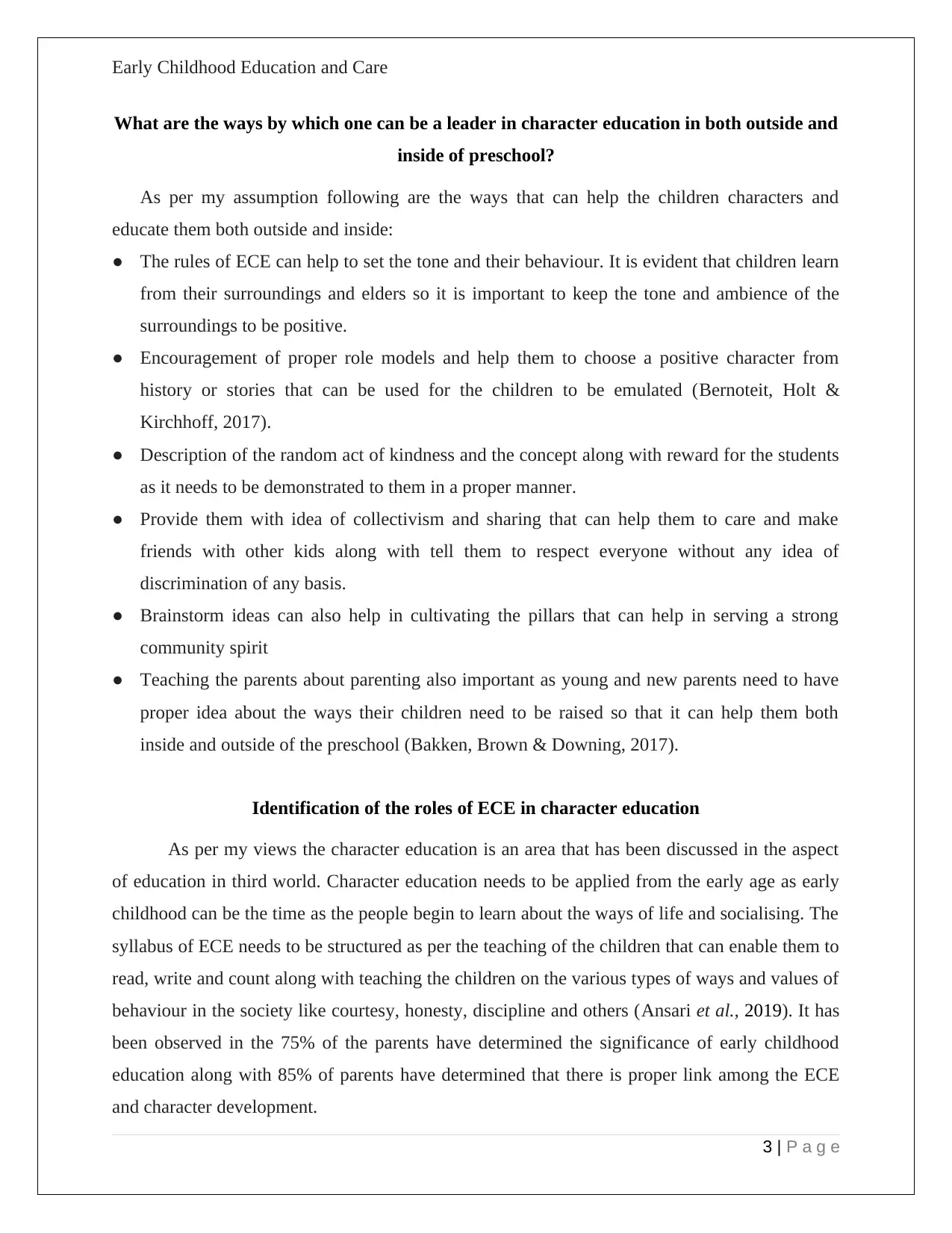
Early Childhood Education and Care
What are the ways by which one can be a leader in character education in both outside and
inside of preschool?
As per my assumption following are the ways that can help the children characters and
educate them both outside and inside:
● The rules of ECE can help to set the tone and their behaviour. It is evident that children learn
from their surroundings and elders so it is important to keep the tone and ambience of the
surroundings to be positive.
● Encouragement of proper role models and help them to choose a positive character from
history or stories that can be used for the children to be emulated (Bernoteit, Holt &
Kirchhoff, 2017).
● Description of the random act of kindness and the concept along with reward for the students
as it needs to be demonstrated to them in a proper manner.
● Provide them with idea of collectivism and sharing that can help them to care and make
friends with other kids along with tell them to respect everyone without any idea of
discrimination of any basis.
● Brainstorm ideas can also help in cultivating the pillars that can help in serving a strong
community spirit
● Teaching the parents about parenting also important as young and new parents need to have
proper idea about the ways their children need to be raised so that it can help them both
inside and outside of the preschool (Bakken, Brown & Downing, 2017).
Identification of the roles of ECE in character education
As per my views the character education is an area that has been discussed in the aspect
of education in third world. Character education needs to be applied from the early age as early
childhood can be the time as the people begin to learn about the ways of life and socialising. The
syllabus of ECE needs to be structured as per the teaching of the children that can enable them to
read, write and count along with teaching the children on the various types of ways and values of
behaviour in the society like courtesy, honesty, discipline and others (Ansari et al., 2019). It has
been observed in the 75% of the parents have determined the significance of early childhood
education along with 85% of parents have determined that there is proper link among the ECE
and character development.
3 | P a g e
What are the ways by which one can be a leader in character education in both outside and
inside of preschool?
As per my assumption following are the ways that can help the children characters and
educate them both outside and inside:
● The rules of ECE can help to set the tone and their behaviour. It is evident that children learn
from their surroundings and elders so it is important to keep the tone and ambience of the
surroundings to be positive.
● Encouragement of proper role models and help them to choose a positive character from
history or stories that can be used for the children to be emulated (Bernoteit, Holt &
Kirchhoff, 2017).
● Description of the random act of kindness and the concept along with reward for the students
as it needs to be demonstrated to them in a proper manner.
● Provide them with idea of collectivism and sharing that can help them to care and make
friends with other kids along with tell them to respect everyone without any idea of
discrimination of any basis.
● Brainstorm ideas can also help in cultivating the pillars that can help in serving a strong
community spirit
● Teaching the parents about parenting also important as young and new parents need to have
proper idea about the ways their children need to be raised so that it can help them both
inside and outside of the preschool (Bakken, Brown & Downing, 2017).
Identification of the roles of ECE in character education
As per my views the character education is an area that has been discussed in the aspect
of education in third world. Character education needs to be applied from the early age as early
childhood can be the time as the people begin to learn about the ways of life and socialising. The
syllabus of ECE needs to be structured as per the teaching of the children that can enable them to
read, write and count along with teaching the children on the various types of ways and values of
behaviour in the society like courtesy, honesty, discipline and others (Ansari et al., 2019). It has
been observed in the 75% of the parents have determined the significance of early childhood
education along with 85% of parents have determined that there is proper link among the ECE
and character development.
3 | P a g e
Paraphrase This Document
Need a fresh take? Get an instant paraphrase of this document with our AI Paraphraser

Early Childhood Education and Care
Conclusion
From the above study it can be concluded that early childhood education has grown its
importance in the modern world where the children of 2 to 6 years are vulnerable to materials
due to social media that may not be suitable for them. ECE can help the children to guide in a
proper direction and help to grow in a significant manner.
4 | P a g e
Conclusion
From the above study it can be concluded that early childhood education has grown its
importance in the modern world where the children of 2 to 6 years are vulnerable to materials
due to social media that may not be suitable for them. ECE can help the children to guide in a
proper direction and help to grow in a significant manner.
4 | P a g e
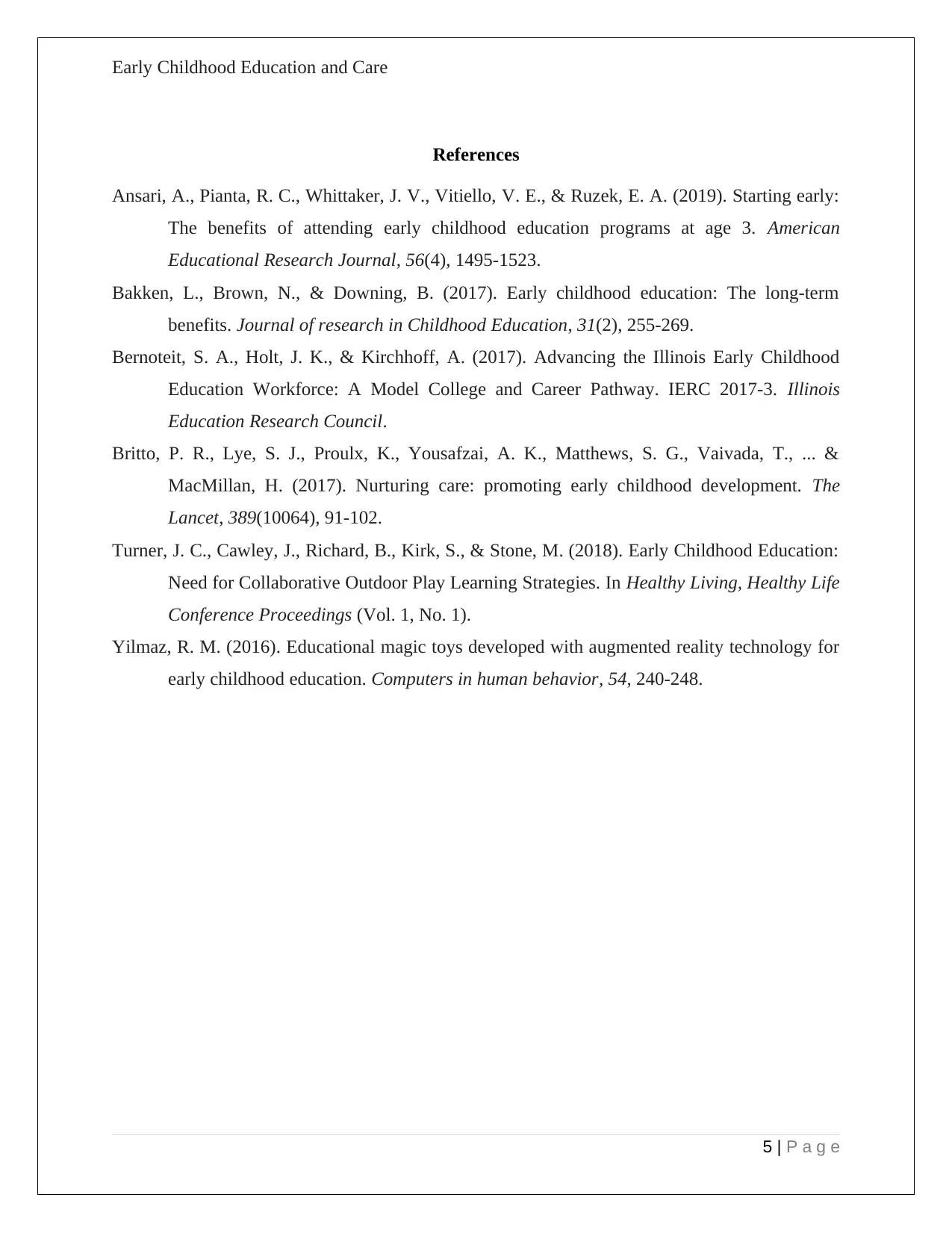
Early Childhood Education and Care
References
Ansari, A., Pianta, R. C., Whittaker, J. V., Vitiello, V. E., & Ruzek, E. A. (2019). Starting early:
The benefits of attending early childhood education programs at age 3. American
Educational Research Journal, 56(4), 1495-1523.
Bakken, L., Brown, N., & Downing, B. (2017). Early childhood education: The long-term
benefits. Journal of research in Childhood Education, 31(2), 255-269.
Bernoteit, S. A., Holt, J. K., & Kirchhoff, A. (2017). Advancing the Illinois Early Childhood
Education Workforce: A Model College and Career Pathway. IERC 2017-3. Illinois
Education Research Council.
Britto, P. R., Lye, S. J., Proulx, K., Yousafzai, A. K., Matthews, S. G., Vaivada, T., ... &
MacMillan, H. (2017). Nurturing care: promoting early childhood development. The
Lancet, 389(10064), 91-102.
Turner, J. C., Cawley, J., Richard, B., Kirk, S., & Stone, M. (2018). Early Childhood Education:
Need for Collaborative Outdoor Play Learning Strategies. In Healthy Living, Healthy Life
Conference Proceedings (Vol. 1, No. 1).
Yilmaz, R. M. (2016). Educational magic toys developed with augmented reality technology for
early childhood education. Computers in human behavior, 54, 240-248.
5 | P a g e
References
Ansari, A., Pianta, R. C., Whittaker, J. V., Vitiello, V. E., & Ruzek, E. A. (2019). Starting early:
The benefits of attending early childhood education programs at age 3. American
Educational Research Journal, 56(4), 1495-1523.
Bakken, L., Brown, N., & Downing, B. (2017). Early childhood education: The long-term
benefits. Journal of research in Childhood Education, 31(2), 255-269.
Bernoteit, S. A., Holt, J. K., & Kirchhoff, A. (2017). Advancing the Illinois Early Childhood
Education Workforce: A Model College and Career Pathway. IERC 2017-3. Illinois
Education Research Council.
Britto, P. R., Lye, S. J., Proulx, K., Yousafzai, A. K., Matthews, S. G., Vaivada, T., ... &
MacMillan, H. (2017). Nurturing care: promoting early childhood development. The
Lancet, 389(10064), 91-102.
Turner, J. C., Cawley, J., Richard, B., Kirk, S., & Stone, M. (2018). Early Childhood Education:
Need for Collaborative Outdoor Play Learning Strategies. In Healthy Living, Healthy Life
Conference Proceedings (Vol. 1, No. 1).
Yilmaz, R. M. (2016). Educational magic toys developed with augmented reality technology for
early childhood education. Computers in human behavior, 54, 240-248.
5 | P a g e
⊘ This is a preview!⊘
Do you want full access?
Subscribe today to unlock all pages.

Trusted by 1+ million students worldwide
1 out of 6
Related Documents
Your All-in-One AI-Powered Toolkit for Academic Success.
+13062052269
info@desklib.com
Available 24*7 on WhatsApp / Email
![[object Object]](/_next/static/media/star-bottom.7253800d.svg)
Unlock your academic potential
Copyright © 2020–2026 A2Z Services. All Rights Reserved. Developed and managed by ZUCOL.





